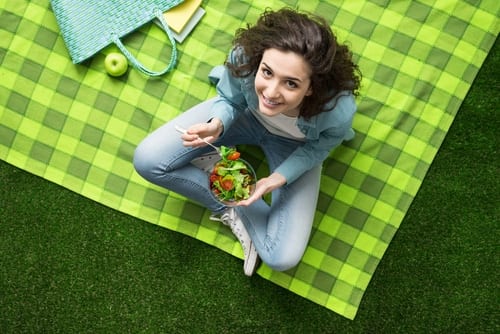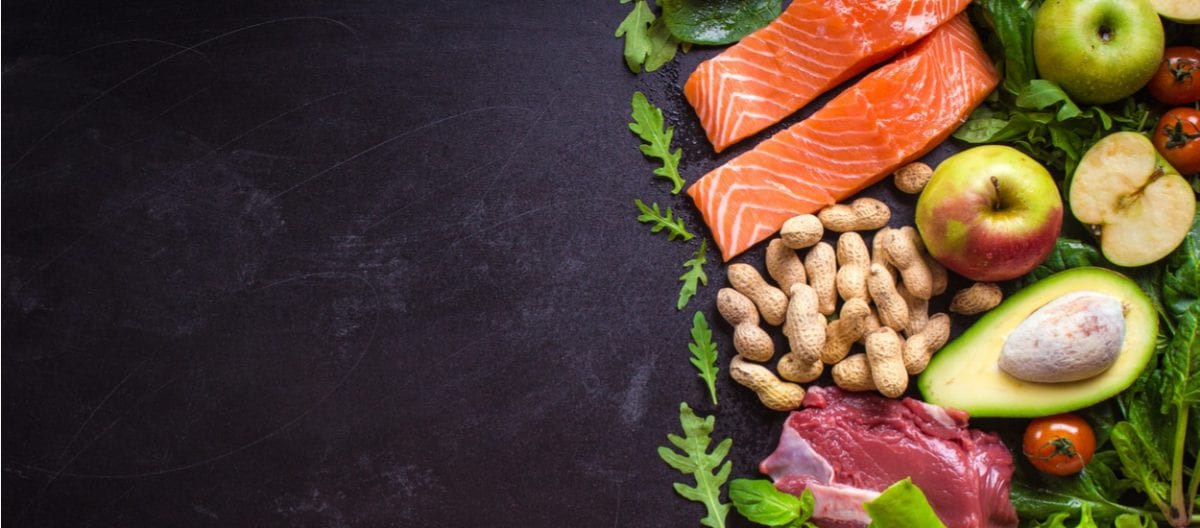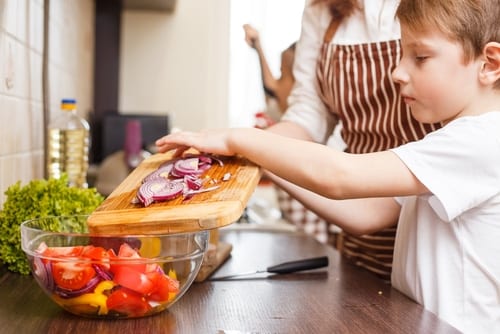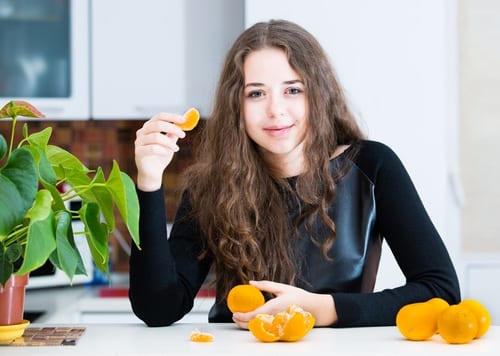Whole30 was something I’d never heard of until I was schmoozing with a girlfriend about my intention to pursue bariatric surgery (surgery to lose weight). I’d gained a ton of weight, due to age and the necessity of taking steroids for an autoimmune conditions. The numbers on the scale were inching toward 200.
I hated the way I looked. I hated myself. I cringed when I caught a glimpse of myself. I hid photos where people tagged me on Facebook. Now that I was going off prednisone, I knew I had to do something drastic to get that poundage off me.
So I was telling my friend about this and she told me three stories about bariatric surgery.
Three Stories
In the first story, her niece had surgery, looked gorgeous, but gained all the weight back as she stretched her stomach out.
In the second story, her nephew had surgery but didn’t lose all that much.
In the third story, her brother had the surgery and lost weight but was sick all the time now. He can only eat a teaspoon of yogurt a few times a day.
“ARGH.” I thought. That was not at all what I wanted to hear.
My friend and I were on our way to meet a group for dinner and a movie. One of that group was my friend’s daughter. We needed a place where it would be possible for her daughter to stick to her diet. What diet was that?
It’s called Whole30.
My friend explained the basics of the diet. You cut out sugars, alcohol, grains, legumes, dairy, and any food preservative you can’t pronounce for 30 days. During this time, you eat meat, fish, eggs, vegetables, fruit, nuts, seeds, and healthy fats and oils, including clarified butter or ghee.
Not only was the daughter doing Whole30, she was doing it with a younger niece, a girl in her early teens.
I loved that idea. Like a buddy system, and a way to make the young girl feel cherished and mature, too.
I watched my friend’s daughter order her food, questioning the waiter carefully to make sure there would be nothing more than olive oil, lemon juice, and salt and pepper on her salad. She ate a plate of eggs and salad, and got a glass of fresh squeezed OJ with nothing added.
“Hmmm,” I thought. “I can do that.”
I went home that evening and googled Whole30. Up until now, diets had seemed so daunting, but this seemed doable, because it was only for 30 days. I figured anyone can do anything for 30 days, right?
I thought maybe doing Whole30 would help me ease into better eating habits and maybe a different, stricter diet. I wanted to try. I wanted to feel like SOMETHING was working, in terms of my food.
Whole30 isn’t a weight loss diet. It’s a reset of your eating habits. Lots of people do lose weight on this diet, because the principles are sound as a way of eating. Many people, in fact, stay on Whole30 as a way of life, or at least do Whole30 twice a year or so to get back to the basics of eating healthy.
Whole30 is kind of arbitrary regarding what is and isn’t allowed. Potatoes, for instance, were permitted beginning in 2014—though if you want French fries or potato chips, you have to make ’em yourself from scratch. I think the point of Whole30 to get back to real food and to stick to something doable. It certainly was for me.
I was thrilled that I could have potatoes and that pretty much decided me. I knew I could hack this diet. I’m a big-time potato lover. I was having a baked potato with olive oil and salt every night and it hit the spot.
Ready For More
But a week in, I knew I could do more. I started looking into various diets and landed on keto. At the same time, I began reading up on the Autoimmune Paleo Protocol (AIP), adopting as many principles as possible from the protocol and eliminating a group of foods called FODMAPs, as well. I was seeing diet as a way of possibly healing myself, and if not, at least as a way of not making things worse!
I began following all these diets, but also stuck to Whole30, because I’d made a commitment and felt it important to keep it.
My friend’s daughter and her niece both lost weight and were very pleased with themselves. That journey led my friend’s daughter to become paleo. I too, began losing weight. I finished Whole30 and continued on with my keto/AIP diets and the weight began coming off like water.
I was reading a great deal during this time and made important discoveries about the way we eat: the recommendations to eat lots of grains is wrong. Fat isn’t fattening: carbs are fattening.
Heart disease and obesity only became a thing when we started eating lots of carbohydrates as a society.
Whole30 As Achievable Goal
Would Whole30 be a way to help get teenagers to take an interest in healthy eating? Would it incentivize them as it did me, to find a diet that works and stick to it? Perhaps most important of all, would it bolster a teen’s fragile self-confidence by offering a short-term achievable goal?
At that point, I wished my own daughters were still teenagers so I could test the theory. But I had seen my friend’s daughter and her niece stick to Whole30 and succeed. I knew they felt very good about their accomplishment, as did I with my own!
Teenage daughters tend to be obsessed with their weight. At home, I mostly have boys around. They are a little tired of hearing my diet talk, though they do like some of the food I make. A lot. Especially my steak salad.
I spoke to Heather Aanes, a single mother of two, living with multiple sclerosis, who wants a healthier lifestyle for her and her daughters, ages 16 and 13. The girls recently began following the Whole30 plan. “As a single parent, I feel like I am giving the girls awesome life skills and I love that they are eating their fruits and vegetables,” said Aanes. “We are preparing meals together. Grocery shopping has been a scavenger hunt, and fun, asking strangers where items are, and finding the foods we would not normally eat.
“All around, it’s been a great experience.”
I looked on the web to see what else I could find out about teens and Whole30. I found this thread of Whole30 compliant moms talking about how they deal with their teens while on the diet. A mom in Southern California, Dukunbayi, wrote: “My almost 17 yo daughter loves veggies and is very interested in health and good food choices and, while not officially doing a W30 with me, is very supportive and following closely behind.”
The thread was not exclusively about teenage daughters. jCrush wrote about her experience with her teenage sons and Whole30:
“I have two teenage boys ages 13 and 15. They both have acne and horrible eating habits. We are on our 16th day of W30 as a family. I finally realized that I am in control of what I buy and prepare and if they are hungry, they will eat! Previous to starting this, my 13 year old’s diet consisted of a granola bar for breakfast, PB&J, cheez -its and fruit for lunch, and if I didn’t cook dinner (which due to the boys being involved in sports and band was fairly often) he would eat fish sticks or pizza for dinner. Now he has been eating what I serve with very little complaining and he actually requests brussell sprouts for dinner (and loves brussell sprout chips for snack). I do get up and make breakfast and pack lunches every morning,which has taken some getting used to, but I feel that the changes in eating habits we are creating makes it worth it! I have gotten my fair share of ‘Why can’t there be more variety of snacks’ or ‘Why can’t we eat_____’. But overall I feel that they really are eating things that they would have never tried before and they have even thanked me for caring about them enough to put forth the effort. They keep asking me what happens after the W30 as far as our eating goes. I just tell them that we will no longer have processed food in the house, but they will not be banned from fast food forever. They have done an amazing job and I am so proud of them!!!”
Next I ventured over to the Whole30 website, where I found the story of Katie, a 16-year-old girl who decided to do the Whole30 challenge. I highly recommend reading Katie’s whole story, but here’s an excerpt:
“There were many temptations thrown my way, from school lunches, family parties, and holiday activities I had to show my self-control and not give in to the many unhealthy foods that were brought my way. When I wanted to cheat or quit the program, I had to fight. There were many nights where I wanted the bag of chips in the pantry or make a batch of cookies, but I knew I couldn’t. When I was attending a place where I knew they didn’t have the food I could eat I always had snacks on hand. (Having a snack has saved me many times.) Family parties and holiday activities really put my self-control to the test, but after those hard days, I felt like I won something. I was so proud of myself. The hard nights are the reasons I have the results that I do.”
Katie’s experience proves what I suspected: that doing Whole30 can give a teen a marvelous feeling of accomplishment and that it’s a doable goal of short-term duration.
How is Katie doing today? She’s on round six of Whole30 and has lost 45 pounds. It has, in her own words, helped her come out of her “shell and become a better person.” Katie writes:
“I feel like I am a whole new person. In school, I work harder and focus better. I fall asleep faster and sleep all through the night. I can get through the day without wanting to take a nap. I am overall a more confident and outgoing person. Just one simple month made me change for the better. Because of the Whole30 I like where I am with my weight and I learned to love myself.”
Another teenager, KaLynn, also 16, does Whole30 with her family whenever the group conscious tells them their slipping in their food habits and need a reboot. Talking about how it is to socialize while being on a diet, KaLynn says, “When I go to my friends’ houses, they know I have to at the very least eat gluten-free. I tell them ahead of time about my intolerance and how it affects me, so that gets their thoughts automatically turned toward more healthy choices . . . At first, I thought I was just being a big problem, so I would avoid talking about food and would usually end up not eating much, if anything at all. Then I realized cooking real food recipes together was actually a great way to bond! My friends talk about how they appreciate having me around because it sort of forces them to make better choices and learn to cook. It can be fun!”
Not everyone thinks Whole30 is such a great idea for teens. Time covered Whole30 for teens in 2016. One expert cited, Dr. Alessio Fasano, said the diet wasn’t long enough to serve as an elimination diet. “In a clinical setting, we put patients on these sorts of restrictive diets for three months, because the immune system needs three months to shut off. Thirty days isn’t enough time to turn off systemic inflammation.”
Dr. Gerard Mullin, director of Johns Hopkins’s Celiac Disease Clinic, meanwhile calls Whole30 a “plan for the walking well,” and finally, Dr. David Katz, founding director of Yale University’s Prevention Research Center says “There is no emphasis here on acquiring a full set of skills for healthy living. So it’s not even possible to know if the diet that results from this will be healthful.”
Katz feels that the Whole30 plan is pretty much the “standard ‘go on a diet’ salesmanship.”
As for me, Katie, and KaLynn, Whole30 was a gateway to finding the right way to eat: it taught us to take the time to prepare wholesome food, that our bodies were worth it. It was also a way to have a success early on—a success to build on.
It’s certainly something to consider.



what do you see as the difference between Whole30 and any diet for teens? I’m not understanding what the benefit to Whole30 specifically is — is it the 30 day challenge aspect?
It’s not a weight reduction diet, though many people find they’ve lost weight when the 30 days are up (you’re not allowed to look at the scale until it’s over). It’s a way of getting back to whole foods and really thinking about what you eat. It’s also the 30-day aspect as a short-term goal that is achievable. It led me to try something more specific. I hadn’t really been motivated before that.
Even if a teen is in perfect shape, Whole30 has value because of what it teaches you and what you accomplish.